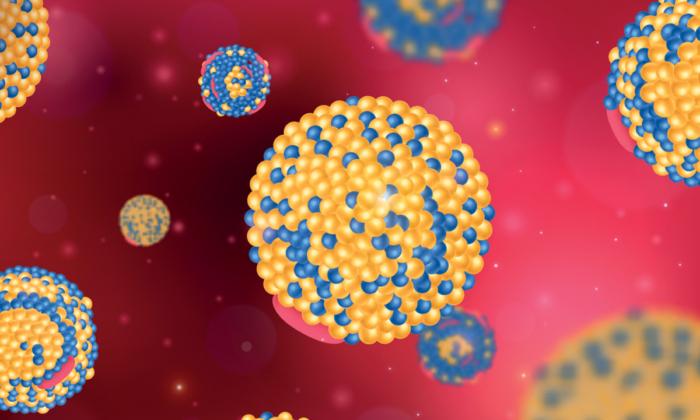
The new drug muvalaplin may be the world’s first drug to treat previously untreatable “bad cholesterol,” according to a new Australian study.
The study, published on Aug. 28 in the Journal of the American Medical Association (JAMA), showed that muvalaplin reduced lipoprotein(a), or Lp(a), a genetically inherited carrier for “bad cholesterol,” by up to 65 percent after two weeks of daily treatment.
Around 1 in 5 people globally have high Lp(a) levels. A serum level above 30 mg/dl puts people at risk of heart disease and heart attack, and above 50 mg/dl raises the risk of stroke.
“When it comes to treating high Lp(a), a known risk factor for cardiovascular disease, our clinicians currently have no effective tools in their kit,” Dr. Stephen Nicholls, a cardiologist, the study’s lead researcher, and a professor at Monash University, said in a press release.
Dr. Nicholls believes the drug could be a “game changer.” Muvalaplin is the first oral drug specifically designed to target Lp(a), according to the study. “Not only do we have an option for lowering an elusive form of cholesterol, but being able to deliver it in an oral tablet means it will be more accessible for patients,” he said.
Since the study only investigated phase 1 of the clinical trial, which tests for drug safety, “it remains uncertain whether Lp(a) lowering with muvalaplin will reduce cardiovascular risk,” the study authors wrote
Only 89 healthy individuals took muvalaplin in phase 1 of the clinical trial. Phase 2 of the trial is ongoing and is due to be completed in 2024.
What Is Lipoprotein(a)?
Lipoprotein(a) is a type of low-density lipoprotein (LDL) particle, most infamous for carrying “bad cholesterol.”
Researchers have debated the accuracy of describing high-density lipoprotein (HDL) as “good cholesterol” and LDL as “bad cholesterol,” considering both cholesterols are the same, just transported by different carriers that perform different functions. Some researchers argue the harm lies in the carrier and not in the cholesterol transported inside.
While normal LDL levels can be influenced through lifestyle and dietary interventions, the Lp(a) levels in the body cannot be since these are influenced mainly by genes. Therefore, very few treatments can lower Lp(a).
Like all LDL particles, the job of Lp(a) is to carry cholesterol and fat from the liver to the tissues in the body. Some of it may get stuck to the blood vessel walls, causing the cholesterol it carries to spill out and form plaques.
Lp(a) is made in the liver, where an extra string of protein known as apolipoprotein(a) is attached to the LDL particle. This extra protein chain makes Lp(a) stickier and may make it more likely to stick together or build up in blood vessel walls.

What Does Muvalaplin Do to Lipoprotein(a)?
Muvalaplin works in the body by blocking the first step that occurs in the liver and causes the proteins to bind together to form a chain.
“This approach mimics naturally occurring variants,” the authors wrote. People with these variants cannot get proteins to interact with each other, resulting in naturally low Lp(a) levels.
The study followed 89 healthy individuals given muvalaplin at varying doses. Half were given a fixed dose, while the other half were given an increasing dosage. Twenty-five participants took the placebo drug.
Within 24 hours of the participants taking muvalaplin, researchers observed a reduction in Lp(a), with a further reduction on repeated dosing. Participants who took the highest dose saw the most rapid Lp(a) clearance.
Overall, participants saw a maximum of 60 percent overall Lp(a) reduction after adjusting for placebo effects, and about 93 percent of participants who took the highest dose had an Lp(a) level below 50 mg/dl after treatment.
Research from the Copenhagen General Population Study estimated that lowering Lp(a) by 50 mg/dl within a five-year period could potentially reduce the risk of a recurring cardiovascular event by 20 percent within the next five years.
The study primarily tested for safety and tolerability. No deaths or serious adverse events were reported among the 89 participants who took muvalaplin.
Common adverse events included headaches, back pain, and fatigue among participants who took a fixed dose. For participants whose dose increased, common symptoms included headaches, diarrhea, abdominal pain, nausea, and fatigue.
Other Treatments for High Lipoprotein(a)
Apart from muvalaplin, lipoprotein apheresis can also lower Lp(a) levels.
The U.S. Food and Drug Administration (FDA) approved lipoprotein apheresis in 2018. The device filters and removes LDL from the blood, including Lp(a) (pdf).
Studies have shown that lipoprotein apheresis can reduce LDL and Lp(a) levels by up to 75 percent immediately after the treatment. Chronic apheresis could reduce the recurrence of cardiovascular events over two years.
Other drugs are still under clinical trials, like olpasiran, a gene therapy drug that disrupts the expression of Lp(a) in the body.
Doctor of pharmacy and cardiovascular research scientist James DiNicolantonio at Saint Luke’s Mid America Heart Institute told The Epoch Times via email that low-dose aspirin can also reduce cardiovascular risk in high Lp(a) individuals.
A 2002 Japanese study showed that taking 81 milligrams of aspirin daily reduced serum Lp(a) levels in people with high Lp(a) by approximately 80 percent. Aspirin may be particularly effective in people with high Lp(a) rather than the general population, one report suggested. Other papers have shown that low-dose aspirin significantly reduces the risk of cardiovascular events in individuals with high Lp(a). However, some studies have drawn conflicting results.
Given that there is already a safe and cheap medication, Mr. DiNicolantonio wondered if the benefit–risk ratio of muvalaplin and lipoprotein apheresis would outweigh taking baby aspirin.